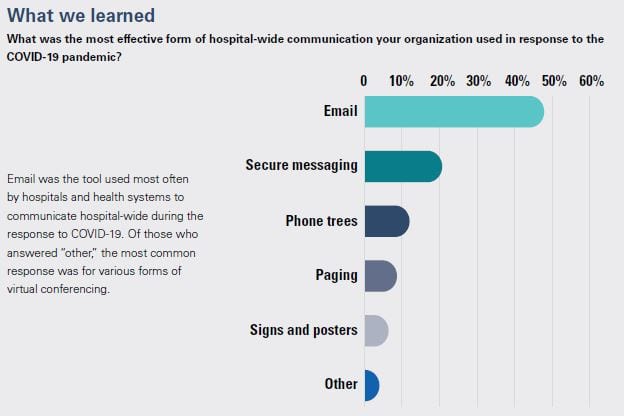50% of respondents to a recent survey said EMAIL was the most effective form of hospital-wide communications during the pandemic. This easily beat out secure messaging which was chosen by only 20% of respondents. The survey of clinicians, healthcare executives and IT staff was conducted late last year by Spok, a healthcare communications provider.
I sat down with Donna Scott, SVP of Marketing for Spok, to explore this and other results from their survey.
Interesting Results
Spok has conducted annual surveys about communication since 2011. In 2020, 600 healthcare professionals responded. The result of the COVID-19 communication question was the most surprising.

I did not expect to see this overwhelming preference for email. After all, it has been a much-maligned form of internal communication and there is constant talk about dropping it in favor of collaboration platforms like Slack and Microsoft Teams.
The Spok survey shows how staff stuck with tried-and-true communication platforms during the crisis. Not only did email top the list, but Phone trees, paging, and signs + posters made it on there too. Virtual conference was relegated to the “other” category.
Single Communication Platform Preferred
Another interesting result from the survey was that 31% of respondents believed that a single platform for communications would improve things at their hospital vs only 14% who believed changing the communication devices would be the most beneficial.
We often hear about a best-of-breed approach when it comes to non-core systems in healthcare. This survey seems to indicate a shift in where internal communications is positioned – that maybe it is becoming a core system rather than an add-on.
“There are so many disjointed communication systems out there,” said Scott. “Disjointed solutions create disjointed communications, which can adversely impact patient care.” Perhaps it’s not as surprising that healthcare organizations are looking to streamline their communication platforms.
Contact Centers Remain Important
During our conversation, Scott mentioned Contact Centers several times as an important communication channel. According to the Spok survey, approximately two thirds of respondents indicated that they view contact centers as an integral part of the patient experience.
“More and more, contact centers are being seen as a valuable asset for hospitals, health systems, and patients,” shared Scott. “During the pandemic, contact centers became the virtual front line; they moved to remote work and the agents became an absolutely vital front line for everyone.”
Uneven Healthcare Cloud Concerns
The Spok survey also provided insight into the current attitude towards the cloud in healthcare. More than two thirds of respondents indicated they had concerns about moving apps to the cloud.
When Scott and her team analyzed this result they noticed that this attitude was unevenly distributed within an organization. IT personnel responding to the survey were not as worried about cybersecurity as other respondents – 37% of IT personnel said they weren’t worried at all.
“We’ve got work to do to provide more facts and information to clinicians, CMIOs and CIOs of hospitals and health systems about cloud security,” Scott said, further noting that many studies have shown that cloud security is actually better than on-premise configurations. Clearly we have a lot more work to do to demonstrate why cloud apps and cloud platforms can be a better option.
Watch the full interview with Scott to hear:
- Why hospitals are still tethered to email solutions and fax machines
- The evolution of “work from home” philosophy in healthcare contact centers
- The difference between paging systems and SMS or smartphone networks
- What CIOs and CMIOs are looking for in streamlined communications
Listen and subscribe to the Healthcare IT Today Interviews Podcast to hear all the latest insights from experts in healthcare IT.
And for an exclusive look at our top stories, subscribe to our newsletter.
Tell us what you think. Contact us here or on Twitter at @hcitoday. And if you’re interested in advertising with us, check out our various advertising packages and request our media Kit.













